| Pages:
1
2
3
4
5
6 |
bfesser
Resident Wikipedian
    
Posts: 2114
Registered: 29-1-2008
Member Is Offline
Mood: No Mood
|
|
Well, for rocks and minerals, I much prefer to find them myself, but I live between two metropolitan centers, and there's not much uncovered ground.
Even if the land weren't developed, I live on a thick layer of glacial till over some unremarkable dolostone. I've been scouting at the local rock
& mineral shows, but haven't found anything worth posting yet. I was hoping to go to the Black Hills and Bighorn Mountains this fall, but it
looks like the plans will be delayed until next year.
|
|
|
IrC
International Hazard
    
Posts: 2710
Registered: 7-3-2005
Location: Eureka
Member Is Offline
Mood: Discovering
|
|
http://www.imagesco.com/articles/articleindex.html
This site has a Geiger counter project and a few interesting things to study:
http://www.imagesco.com/articles/geiger/build_your_own_geige...
They also sell sources to test your counter with:
http://www.imagesco.com/geiger/uranium-ore.html
http://www.imagesco.com/geiger/radioactive-sources.html
They also have a graph for Cs137:
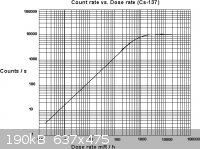
[Edited on 10-22-2013 by IrC]
"Science is the belief in the ignorance of the experts" Richard Feynman
|
|
|
bfesser
Resident Wikipedian
    
Posts: 2114
Registered: 29-1-2008
Member Is Offline
Mood: No Mood
|
|
Testing out a thrift shop scanner, thought I'd share these in case anyone's interested:
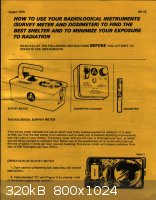 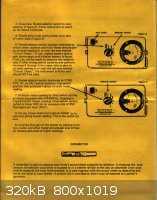 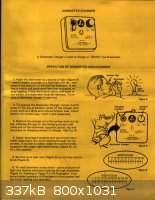 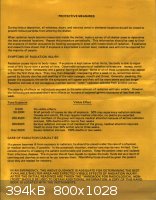
|
|
|
Fenir
Hazard to Self
 
Posts: 68
Registered: 7-5-2013
Member Is Offline
Mood: No Mood
|
|
How much did you pay for the two? It looks like you got a survey meter instead of a Geiger counter. The survey meter is essentially useless unless
you live in Prypiat. However the dosimeter looks quite diverting.
|
|
|
bfesser
Resident Wikipedian
    
Posts: 2114
Registered: 29-1-2008
Member Is Offline
Mood: No Mood
|
|
The instructions are indeed from a surplus Civil Defense survey meter kit; intended for high levels of γ radiation.
|
|
|
BobD1001
Hazard to Others
  
Posts: 182
Registered: 29-3-2013
Member Is Offline
Mood: No Mood
|
|
Just finished a geiger kit
I recently purchased another type of Geiger kit through trough the DIYgeigercounter site. I had compared it to the MightyOhm kit and decided to go
with the DIYgeiger counter as it was virtually the same price and seems to have a little more flexibility in tubes to drive and accessories to use
with it; but mostly just because it looked more challenging to solder  . .
After completing the kit, it works fantastically, and I hope to be able to find some samples of uranium ore for my periodic table display from a local
abandoned copper/silver/lead mine. I am going to be running two SBM-20 tubes in parallel for enhanced sensitivity, although I would love to get a
pancake type tube.
Here are some pictures of the build:
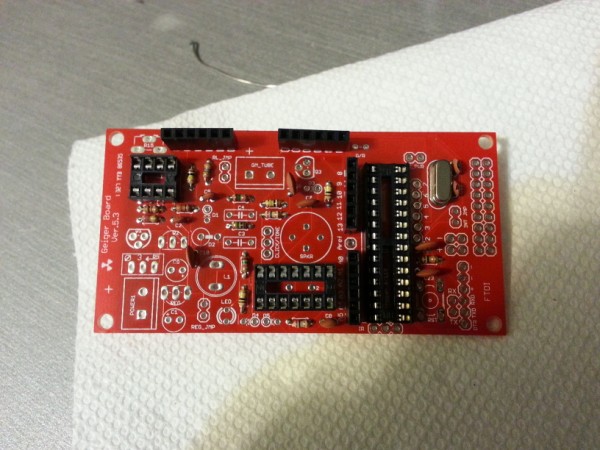
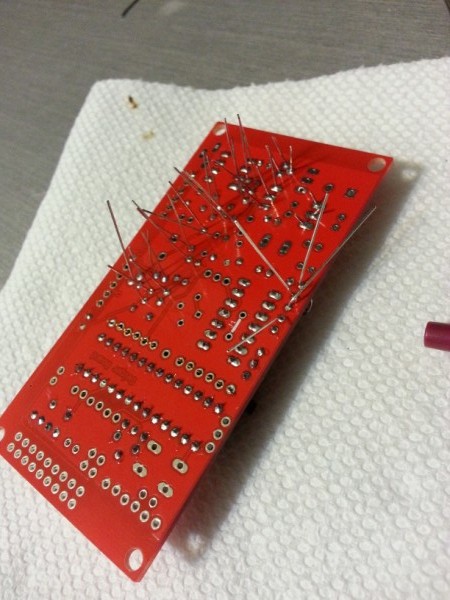
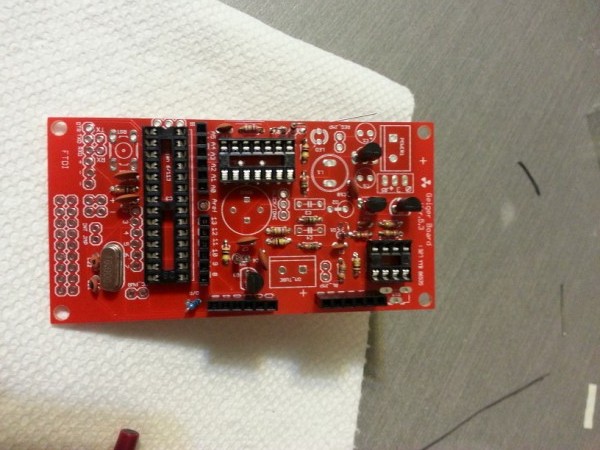
And here is a shot of it up and running with the two SBM-20's in parallel. The source is a thorium lantern mantle I got off eBay for a few bucks.
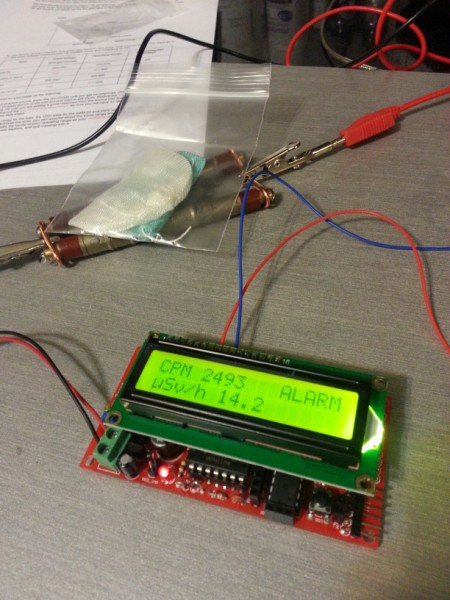
|
|
|
bfesser
Resident Wikipedian
    
Posts: 2114
Registered: 29-1-2008
Member Is Offline
Mood: No Mood
|
|
SL-1 & SRE
Very nice. I've been thinking about trying one of those kits. I'm curious, though; with the additional SBM-20, have you adjusted the dose rate
calculation accordingly?
[1st edit] I've modified the firmware on my mightyohm.com GC slightly. In short; I reduced the LED flash length slightly, added a third 'mode' which
gives more traditional (nostalgic) 'clicks' on the Piezo—rather than the louder 'chirps'—and set it to default to the click mode
when first powered on and cycle through click-chirp-mute when the button is pressed. I haven't cleaned up, optimized, or commented the code yet.
Consider this to be a beta firmware mod.
Attachment: geiger_mod.tar.gz (18kB)
This file has been downloaded 1063 times
In a future version, I plan to adjust the dose rate calculation, among other things.
[2nd edit] <a href="http://en.wikipedia.org/wiki/SL-1" target="_blank">Stationary Low-Power Reactor Number One (SL-1)</a> <img
src="../scipics/_wiki.png" />
<iframe sandbox width="420" height="315" src="//www.youtube-nocookie.com/embed/FAKcWM-yBkI?rel=0" frameborder="0"
allowfullscreen></iframe>
<a href="http://en.wikipedia.org/wiki/Sodium_Reactor_Experiment" target="_blank">Sodium Reactor Experiment (SRE)</a> <img
src="../scipics/_wiki.png" />
<iframe sandbox width="420" height="315" src="//www.youtube-nocookie.com/embed/videoseries?list=PLH27cxqYTgN52BtiAPv49_o_quNR_M8ea" frameborder="0"
allowfullscreen></iframe>
[Edited on 16.12.13 by bfesser]
|
|
|
IrC
International Hazard
    
Posts: 2710
Registered: 7-3-2005
Location: Eureka
Member Is Offline
Mood: Discovering
|
|
I don't see any links to the site the kit came from. On it is a handy page of info to aid in calibrating the GM tubes.
https://sites.google.com/site/diygeigercounter/gm-tubes-supp...
"Science is the belief in the ignorance of the experts" Richard Feynman
|
|
|
bfesser
Resident Wikipedian
    
Posts: 2114
Registered: 29-1-2008
Member Is Offline
Mood: No Mood
|
|
Chernobyl Catastrophe
Some documentaries about the <a href="http://en.wikipedia.org/wiki/Chernobyl_disaster" target="_blank">Chernobyl disaster</a> <img
src="../scipics/_wiki.png" /> on YouTube (chronological order):
<em><a href="http://youtu.be/e3FjkBozlu0?t=33s" target="_blank">NOVA: Back to Chernobyl</a></em> <img
src="../scipics/_yt.png" /> (1989)
<em><a href="http://youtu.be/VDvCoLEpB0c" target="_blank">NOVA: Suicide Mission to Chernobyl</a></em> <img
src="../scipics/_yt.png" /> (1991)
<em><a href="http://youtu.be/hUAATawYCD8" target="_blank">Horizon: Inside Chernobyl Sarcophagus</a></em> <img
src="../scipics/_yt.png" /> (1991)
<em><a href="http://youtu.be/_TQ32XV0B54" target="_blank">Horizon: Fallout from Chernobyl</a></em> <img
src="../scipics/_yt.png" /> (1996)
<em><a href="http://youtu.be/pNvmShXD0vw" target="_blank">Zero Hour: Disaster at Chernobyl</a></em> <img
src="../scipics/_yt.png" /> (2004)
<em><a href="http://youtu.be/5WGUbfzr31s" target="_blank">Seconds From Disaster: Meltdown at Chernobyl</a></em> <img
src="../scipics/_yt.png" /> (2004)
<em><a href="http://youtu.be/3Q7w17VSqTM" target="_blank">The Battle for Chernobyl</a></em> <img src="../scipics/_yt.png"
/> (2006)
<em><a href="http://youtu.be/SYU47v_J9fo" target="_blank">Horizon: Nuclear Nightmares</a></em> <img
src="../scipics/_yt.png" /> (2006)
<em><a href="http://youtu.be/YfulqRdDbsg" target="_blank">Inside Chernobyl</a></em> <img src="../scipics/_yt.png" />
(2012)
These are the highest quality uploads I could find. For <em>Meltodown at Chernobyl</em>, there is another version available <a
href="http://youtu.be/lyqpVOxmw8s" target="_blank">with an American narrator</a> <img src="../scipics/_yt.png" />, but he's annoying
and the video quality is reduced. Please let me know if any of the videos are removed, and I'll try to find another copy. I will be compiling and
posting similar collections of videos for both Three Mile Island, Windscale, and Fukushima as I find time. Or, if you like, you can follow <a
href="http://www.youtube.com/playlist?list=PLH27cxqYTgN7XnLn1zz1Ea7htguJBe1b3" target="_blank">this playlist</a> <img
src="../scipics/_yt.png" /> where I'll be adding videos as I find them.
[Edited on 17.12.13 by bfesser]
|
|
|
dontasker
Harmless

Posts: 40
Registered: 19-12-2012
Member Is Offline
Mood: Plopping
|
|
Looking at the list of videos made me think of:
BBC Horizon: Nuclear Nightmares
Video hosted on DailyMotion
|
|
|
BobD1001
Hazard to Others
  
Posts: 182
Registered: 29-3-2013
Member Is Offline
Mood: No Mood
|
|
Quote: Originally posted by bfesser  | Very nice. I've been thinking about trying one of those kits. I'm curious, though; with the additional SBM-20, have you adjusted the dose rate
calculation accordingly?
|
I haven't yet adjusted the dose rate to compensate for running the two tubes in parallel. I'm not really all that concerned as I'm really just going
to be using the counter to hopefully find some samples of ore for my element collection. In the future if I do any logging or that sort of thing, I
will adjust the code to compensate for it.
I really want to get one of the GPS modules, and log the average counts according to location, as I live somewhat near an active nuclear power plant.
Of course I wouldn't expect to see any above average values near the plant, as its never had an incident, but it would be neat to try just out of
curiosity. The site has a good writeup of it here: https://sites.google.com/site/diygeigercounter/daughterboard... It would be be a neat experiment, just no extra funds to do it!
[Edited on 17-12-2013 by BobD1001]
|
|
|
bfesser
Resident Wikipedian
    
Posts: 2114
Registered: 29-1-2008
Member Is Offline
Mood: No Mood
|
|
It's interesting to note that radiation levels are typically higher near coal power plants than nuclear ones (<a
href="http://en.wikipedia.org/wiki/Fossil-fuel_power_station#Radioactive_trace_elements" target="_blank">ref.</a> <img
src="../scipics/_wiki.png" /> . Luckily for me, there are plenty of each in my
area, including 3 nuclear plants—some decommissioned, but much of the pollution remains. . Luckily for me, there are plenty of each in my
area, including 3 nuclear plants—some decommissioned, but much of the pollution remains.
For GPS, I'd recommend the <a href="http://www.adafruit.com/products/746" target="_blank">Adafruit Ultimate GPS Breakout</a> <img
src="../scipics/_ext.png" />. They've also got it available as an Arduino shield, a wearable breakout, and a bare module. Sparkfun has some <a
href="https://www.sparkfun.com/categories/4" target="_blank">GPS receivers and modules</a> <img src="../scipics/_ext.png" /> as well.
Finally, you'll want to familiarize yourself with <a href="http://en.wikipedia.org/wiki/NMEA_0183" target="_blank">NMEA 0183</a> <img
src="../scipics/_wiki.png" />.
[Edited on 17.12.13 by bfesser]
|
|
|
bfesser
Resident Wikipedian
    
Posts: 2114
Registered: 29-1-2008
Member Is Offline
Mood: No Mood
|
|
Solid-state Gamma Detection with PIN Photodiodes
The title pretty much sums it up. Not much to say, except that I'll be checking between the couch cushions for change to order some <a
href="http://www.mouser.com/ProductDetail/OSRAM-Opto-Semiconductors/BPW-34/?qs=sGAEpiMZZMtWNtIk7yMEsZEKXNTNxzvbiGrwFlDOnN8%3d"
target="_blank">BPW34</a> <img src="../scipics/_ext.png" /> <a href="http://en.wikipedia.org/wiki/PIN_diode"
target="_blank">PIN</a> <img src="../scipics/_wiki.png" /> <a href="http://en.wikipedia.org/wiki/Photodiode"
target="_blank">photodiodes</a> <img src="../scipics/_wiki.png" /> for experimenting with <a
href="http://en.wikipedia.org/wiki/Solid-state_(electronics)" target="_blank">solid-state</a> <img src="../scipics/_wiki.png" /> <a
href="http://en.wikipedia.org/wiki/Gamma_ray" target="_blank">gamma ray</a> <img src="../scipics/_wiki.png" /> detection.
Here are the better of the websites I've been looking at (sorry, my favorite are in German):
<a href="http://www.b-kainka.de/bastel131.html" target="_blank">Das Gammastrahlen-Mikrofon</a> <img src="../scipics/_ext.png" />
(b-kainka.de) ~ <em>"The gamma-ray Microphone"</em>
<a href="http://www.elektronik-labor.de/Projekte/Gamma3.html" target="_blank">Der Gammadetektor III</a> <img src="../scipics/_ext.png"
/> (b-kainka.de) ~ <em>"The gamma detector III"</em>
<a href="http://www.elektronik-labor.de/Projekte/Alpha5.html" target="_blank">Kernstrahlungs-Spektrometer</a> <img
src="../scipics/_ext.png" /> (b-kainka.de) ~ <em>"Nuclear radiation spectrometers"</em>
<a href="http://www.vk2zay.net/article/265" target="_blank">Photodiode Gamma Ray Detector</a> <img src="../scipics/_ext.png" />
(Alan's Lab)
<a href="http://www.dgkelectronics.com/a-radiation-detector-with-a-solid-state-pin-diode-sensor/" target="_blank">A radiation detector with a
solid-state PIN-diode sensor</a> <img src="../scipics/_ext.png" /> (DGK Electronics)
I'll upload all the PDFs I've collected:
<table><tr><td><em>Application circuit examples of Si photodiode</em><br
/> Hamamatsu Photonics (appnote)</td><td>Attachment: appnote_Hamamatsu.pdf (64kB)
This file has been downloaded 1178 times</td></tr><tr><td><em>Gamma-Photon Radiation Detector</em><br
/> Maxim Integrated (appnote)</td><td>Attachment: appnote_Maxim.pdf (78kB)
This file has been downloaded 1132 times</td></tr><tr><td><em>Silicon PIN Photodiode: BPX 61</em><br
/> Osram Opto Semi. (datasheet)</td><td>Attachment: datasheet_bpx61.pdf (192kB)
This file has been downloaded 1187 times</td></tr><tr><td><em>Si PIN photodiodes: S1223 series</em><br
/> Hamamatsu Photonics (datasheet)</td><td>Attachment: datasheet_s1223.pdf (615kB)
This file has been downloaded 988 times</td></tr><tr><td><em>PIN Photodiode Based X and γ Ray Detectors</em><br
/> E. Emirhan & C.S. Ozben</td><td>Attachment: Emirhan_Ozben.pdf (954kB)
This file has been downloaded 3357 times</td></tr><tr><td><em>Measure Gamma Rays with a Photodiode:<br />Radiation detector using a BPW34</em><br
/> B. Kainka</td><td valign="top">Attachment: Kainka.pdf (531kB)
This file has been downloaded 9335 times</td></tr><tr><td><em>Gamma-Ray Detectors</em><br /> H.A.
Smith Jr. & M. Lucas</td><td>Attachment: Smith_Lucas.pdf (1.2MB)
This file has been downloaded 1596 times</td></tr><tr><td><em>An Intro. to Semiconductor Radiation Detectors</em><br
/> C.W. Thiel</td><td>Attachment: Thiel.pdf (1.3MB)
This file has been downloaded 1921 times</td></tr></table>
[Edited on 6.1.14 by bfesser]
|
|
|
IrC
International Hazard
    
Posts: 2710
Registered: 7-3-2005
Location: Eureka
Member Is Offline
Mood: Discovering
|
|
"sorry, my favorite are in German"
Another site : http://www.rapp-instruments.de/
"Science is the belief in the ignorance of the experts" Richard Feynman
|
|
|
bfesser
Resident Wikipedian
    
Posts: 2114
Registered: 29-1-2008
Member Is Offline
Mood: No Mood
|
|
<iframe sandbox width="560" height="315" src="//www.youtube-nocookie.com/embed/zMDUzDBzFD8?rel=0" frameborder="0"
allowfullscreen></iframe>
<a href="http://www.teviso.com/" target="_blank">TEVISO Sensor Technologies Ltd.</a> <img src="../scipics/_ext.png" />
|
|
|
neptunium
National Hazard
   
Posts: 990
Registered: 12-12-2011
Location: between Uranium and Plutonium
Member Is Offline
|
|
the technology is getting better and better with every new breakthrough in electronics! what used to betens of thousands of dollars of investments
and constant supply of liquid nitrogen when i was studying nuclear physics 15 years ago is now availlable for hundreds! and no cooling !
i wonder how far these diodes can go...
the videos doesnt explain what type of display device and compatibility those semi conductors work with ... shame
also check out this video...
http://www.youtube.com/watch?v=BRdZouC7CRo
i think he gets it arround exit 79 on I40 in new Mexico for anyone familiar with the area
[Edited on 7-1-2014 by neptunium]
|
|
|
IrC
International Hazard
    
Posts: 2710
Registered: 7-3-2005
Location: Eureka
Member Is Offline
Mood: Discovering
|
|
Yeah I used to pick up good Carnotite rocks north of what is now Sky City Casino a little ways past Grants. That would put it more like the 89 mile
marker or thereabouts. However look east to Santa Rosa, go up a main gravel road a few miles north of town. Bring a few pickup trucks as you can find
a ton of several different species, my favorite for high rad levels being Coffinite. Real hard to find anywhere else by the way except at a few
locations in Colorado. This location was big decades ago but not well liked by the people there. I knew a few families who lost their providers
working to mine Uranium and IIRC Radium. No safety procedures at all. Pretty much the company had workers hands on with the rocks with virtually zero
protection. From the stories one lady friend in particular had the company didn't seem to care much if workers died from terrible cancers as her
husband did. Think of the 40's and 50's and coal miner stories, but add high levels of radiation much of which was breathed in daily in dust by the
workers. By the 70's it was mostly all closed down and played out. You can find more specimens by the tons in tailing piles than you would ever want
to haul away.
"Science is the belief in the ignorance of the experts" Richard Feynman
|
|
|
bfesser
Resident Wikipedian
    
Posts: 2114
Registered: 29-1-2008
Member Is Offline
Mood: No Mood
|
|
IrC, that sounds like heaven to me. I'll have to mark it on my maps. 
neptunium, that techniques in that video always make me cringe.
|
|
|
IrC
International Hazard
    
Posts: 2710
Registered: 7-3-2005
Location: Eureka
Member Is Offline
Mood: Discovering
|
|
Quote: Originally posted by bfesser  | IrC, that sounds like heaven to me. I'll have to mark it on my maps. 
neptunium, that techniques in that video always make me cringe. |
If really hot specimens is your goal I'll give you a better place. Picture this. All day I am marveling at the weirdest saguaro cactus I have ever
seen. A large arm goes up as is normal, halfway up the arm is another arm coming out growing down. Like one cactus sticking out of another but it
naturally grew that way, a single cactus. Many like it or even stranger looking, especially odd looking prickly pear everywhere you look. Warm night
so I put the campfire out after making coffee. Getting used to the dark lying there looking at an amazingly rich field of stars. But I keep noticing a
strange very dim blue glow all around, especially coming from the dry creek bed. Before any physics majors come in saying that's not possible my reply
is I saw it with my own eyes. That trip I was prospecting from experience along with my trusty mineral book and chemical kit, last time in Phoenix no
one had any 'B' batteries in stock so my Precision 111B sat in the trunk dead as a hammer. I had nothing to detect radiation with.
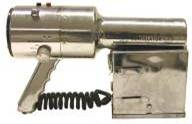
Next day I study the area and in the middle of the dry creek, a smooth bedrock surface, I notice thousands of jet black botryoidal bumps in the rock.
You guessed it, Uraninite. With the highest concentration of Radium I have ever found.
http://national-radiation-instrument-catalog.com/Image170.gi...
http://upload.wikimedia.org/wikipedia/commons/e/e7/Pitchblen...
Spent a few days with hammer and chisel filling a backpack so full it was hard to carry even on my back. Took it back down to *a place* where it could
be measured in Phoenix as I had no way to test for radioactivity. As luck would have it the transmission went out of my car, 1975, dead economy few
jobs so it took a while to fix my car and outfit for a trip back to stake a claim. A large company claimed it before I returned and ran a mine there
for several years. I know without doubt *this person* had friends in the business and of course I had stupidly told him exactly where it was.
Years later they restored the natural look to the place but believe me there is still a huge amount there as I had found outcrops in over a mile in
any direction. I bring all this up because if you really want to go out and add to your collection the hottest rocks you will ever find in the US is
there. I know this because 8 months later the Arizona Republic had a front page pic of my campsite with the headline "largest Uranium and Radium
discovery in US history". True story.
A little way north of the Grand Canyon, 20 miles southwest of Fredonia Arizona is a box canyon called Hacks Canyon. Dry dead for eons stream bed, the
very one I filled my pack in. You should make a trip this summer and bring your counters, pick and other tools. Would be well worth the trip even
after the mining closed down so long ago. I know it's worth your trip because to this day you can see the blue glow all around, just search for the
most deformed freaking odd cactus you have ever seen. It occurs in patches here and there for a mile in diameter, they only mined the creek bed.
Wherever you see patches of deformed cacti you have only a few inches to dig to bedrock to see the formations of black glowing grapes (at night).
First time I ever gave out my best location but I'm too old to ever go back so what the hell if some of you want to grab a great collection of
specimens more power to you. While your there head south over Mt Trumbull (take a survey map it's gravel roads through wilderness) and visit the North
rim of the Grand Canyon. They may be paved now it's been been nearly 40 years since my last trip there. Or go back out to the highway to get there. By
far the greatest place to see it from, without all the endless lines of tourists, they nearly all visit the site from the south rim.
**Occurs to me mentioning the location, year, and job position of the one who gave out my find location could make it simple to get a name and open
possible liability for myself and SCM. Being almost 4 decades ago I can not prove it even if there was no other possible source that could have sold
the information. Long ago loss may as well be safe and keep identities obscure.
[Edited on 1-7-2014 by IrC]
"Science is the belief in the ignorance of the experts" Richard Feynman
|
|
|
bfesser
Resident Wikipedian
    
Posts: 2114
Registered: 29-1-2008
Member Is Offline
Mood: No Mood
|
|
Damn. I just missed an auction for a mint condition <a href="http://www.orau.org/ptp/collection/surveymeters/precisiondeluxe.htm"
target="_blank">Precision 111</a> <img src="../scipics/_ext.png" /> on eBay a couple months ago. I'm still mad at myself for not
selling a kidney to get it—I think it went for only around 40 USD. Unfortunately, I'm broke as all hell, and surely won't be able to come
up with funds or transportation from the MN tundra all the way to the AZ desert. I'll certainly take note of the location, though, and will try to
find some geologic maps of the area.
[Edited on 7.1.14 by bfesser]
|
|
|
Dany
Hazard to Others
  
Posts: 482
Registered: 3-8-2013
Member Is Offline
Mood: No Mood
|
|
Fireball and blastwave from Grable nuclear detonation
Very beautiful video of the explosion of a nuclear shell at low altitude, fired from nuclear cannon (280 mm). the test name is Grable (1953) and
shows the effect of an explosion of a low altitude nuclear device. The device in the form of a shell uses the gun type mechanism (same as Little
boy-Hiroshima) to detonate the warheads. The intense shock wave from the warheads will reflect when touch the ground, and after a short time it fuses
with the incident shock wave so as to form a Mach wave which can have twice peak pressure as that of incident wave. The Mach wave can inflict
extensive damage when interacting with object in it's path.
Grable test (1953)
Dany.
|
|
|
violet sin
International Hazard
    
Posts: 1482
Registered: 2-9-2012
Location: Daydreaming of uraninite...
Member Is Offline
Mood: Good
|
|
impressive, thanks for sharing. that was well restored and beautiful even in full-screen 
|
|
|
bfesser
|
Threads Merged
7-1-2014 at 18:03 |
bfesser
Resident Wikipedian
    
Posts: 2114
Registered: 29-1-2008
Member Is Offline
Mood: No Mood
|
|
ExcelPhysics APOC Mini Radiation Detector
While browsing around, I found this reasonably-priced <a href="http://excelphysics.com/collections/apoc-detector/products/apoc-basic-kit"
target="_blank">gamma detector kit</a> <img src="../scipics/_ext.png" /> based on an array of seven BPW34 PIN photodiodes in parallel
and an LM311 comparator. I'm working on designing my own small BPW34-based detector, which I hope to enclose in a small aluminum flashlight housing,
but this kit is very tempting. The sellers also carry the <a
href="http://excelphysics.com/collections/frontpage/products/apoc-basic-kit-no-enclosure" target="_blank">kit
<em>sans</em>-enclosure</a> <img src="../scipics/_ext.png" /> and what appear to be homemade 10n<a
href="http://en.wikipedia.org/wiki/Curie" target="_blank">Ci</a> <img src="../scipics/_wiki.png" /> <a
href="http://en.wikipedia.org/wiki/Isotopes_of_thorium#Thorium-232" target="_blank"><sup>232</sup>Th</a> <img
src="../scipics/_wiki.png" /> <a href="http://excelphysics.com/collections/frontpage/products/confirmation-source-disk" target="_blank">check
sources</a> <img src="../scipics/_ext.png" />.
<img src="http://cdn.shopify.com/s/files/1/0223/5841/products/APOC_Basic_1024x1024.jpg" height="200" /> <img
src="http://cdn.shopify.com/s/files/1/0223/5841/products/Finished_Top_No_Tape_grande_1024x1024.jpg" height="200" /> <img
src="http://cdn.shopify.com/s/files/1/0223/5841/products/Confirmation_Disk_1024x1024.jpg" height="200" />
While I can't vouch for it (yet), this kit might be an option for those who cannot purchase the MightyOhm kit due to import/export restrictions.
Attachment: LM311_datasheet.pdf (1.1MB)
This file has been downloaded 887 times
[edit] Evidently they had a successful <a href="http://www.kickstarter.com/projects/excelphysics/apoc-mini-radiation-detector"
target="_blank">KickStarter</a> <img src="../scipics/_ext.png" /> campaign early last year, and will be developing a more advanced unit
with an integrated <a href="http://www.parallax.com/microcontrollers/propeller" target="_blank">Propeller</a> <img
src="../scipics/_ext.png" /> microcontroller.
[Edited on 9.1.14 by bfesser]
|
|
|
neptunium
National Hazard
   
Posts: 990
Registered: 12-12-2011
Location: between Uranium and Plutonium
Member Is Offline
|
|
thanks for this fascinating story Irc ! i will have to plan one of my trips there this summer! however because of new regulations and radiation
detectors at weigh stations there is a radiological limit to how much ore one can haul away... ha the good old days pre 9/11
|
|
|
bfesser
Resident Wikipedian
    
Posts: 2114
Registered: 29-1-2008
Member Is Offline
Mood: No Mood
|
|
Any chance you want to swing by the Twin Cities
(Minnesota) or Des Moines to pick up a hitchhiker along the way? An extra set of eyes and strong shoulders never hurt when prospecting or rock
hunting.  Although I suppose the shortest land route for you would be through
Indianapolis, St. Louis, Oklahoma City, and Albuquerque. Although I suppose the shortest land route for you would be through
Indianapolis, St. Louis, Oklahoma City, and Albuquerque.
[edit] Re. IrC's first-hand observations:
<a href="http://en.wikipedia.org/wiki/Botanical_prospecting_for_uranium" target="_blank">Botanical Uranium Prospecting</a> <img
src="../scipics/_wiki.png" />
<strong><a href="viewthread.php?tid=17295">Radium glow</a></strong>
[Edited on 9.1.14 by bfesser]
|
|
|
| Pages:
1
2
3
4
5
6 |